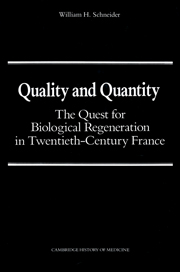Book contents
- Frontmatter
- Contents
- Preface
- 1 Introduction
- 2 Degeneration and regeneration
- 3 From puericulture to eugenics
- 4 The French Eugenics Society up to 1920
- 5 Postwar eugenics and social hygiene
- 6 The campaign for a premarital examination law
- 7 French eugenics in the 1930s
- 8 Eugenics, race, and blood
- 9 Race and immigration
- 10 Vichy and eugenics
- 11 Conclusion
- Notes
- Selected bibliography
- Index
3 - From puericulture to eugenics
Published online by Cambridge University Press: 10 March 2010
- Frontmatter
- Contents
- Preface
- 1 Introduction
- 2 Degeneration and regeneration
- 3 From puericulture to eugenics
- 4 The French Eugenics Society up to 1920
- 5 Postwar eugenics and social hygiene
- 6 The campaign for a premarital examination law
- 7 French eugenics in the 1930s
- 8 Eugenics, race, and blood
- 9 Race and immigration
- 10 Vichy and eugenics
- 11 Conclusion
- Notes
- Selected bibliography
- Index
Summary
Why was there a thirty to forty-year wait between Galton's first formulation of eugenic ideas and the creation of formal eugenics organizations? As Chapter 2 has shown, there was no lack of awareness that France faced many problems associated with decline and decadence at the end of the nineteenth century; and there were in fact many proposals to remedy them on a biological basis. Some proposals, such as the solidarism of Léon Bourgeois, soon moved away from their scientific origins to assume a more clearly political character, but others, such as the social hygiene movement, developed along strikingly similar lines to eugenics. As will be seen in this chapter, hereditarian ideas were also well enough known in these biologically based reform circles to produce several proposals of an explicit eugenic nature. For example, as early as 1862 Clémence Royer called in the preface to her translation of Darwin's Origin of species for allowing natural selection to do its job of eliminating “the weak, the infirm, the incurable, the wicked themselves and all the disgraces of nature.” The French also had available at an early date in their own language a contemporary study similar to Galton's Hereditary genius, thanks to the work of the Swiss botanist Alphonse Candolle, whose Histoire des sciences et savants appeared in 1873.
The important point here is not the question of priority, but rather why it took so long in both the English and French-speaking worlds for these studies about the inheritance of superior intellectual qualities to inspire organized eugenic movements.
- Type
- Chapter
- Information
- Quality and QuantityThe Quest for Biological Regeneration in Twentieth-Century France, pp. 55 - 83Publisher: Cambridge University PressPrint publication year: 1990
- 1
- Cited by



